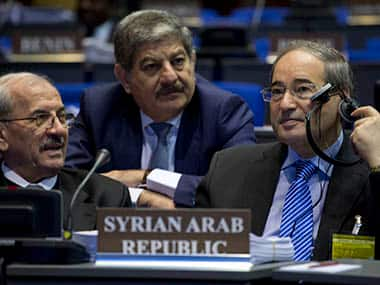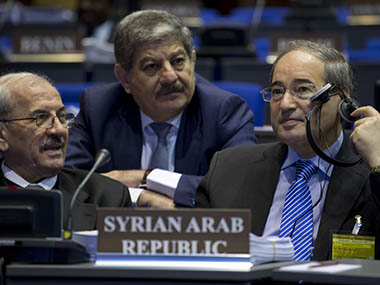The Hague, Netherlands: Syria’s deputy foreign minister warned Monday that efforts to rid his country of chemical weapons could fail if the international community does not contribute money and equipment. Faisal Mekdad told reporters at a meeting of the Organization for the Prohibition of Chemical Weapons his country needs armored vehicles and other resources to move chemicals out of Syria for destruction. “Without these resources it will be difficult if not impossible for Syria and for all OPCW to implement the decisions,” he said. [caption id=“attachment_1262947” align=“alignleft” width=“380”]
 Dr. Faisel Mekdad of the Syrian Arab Republic, right waits for the start of the eighteenth session of the Conference of the States Parties of the Organisation for the Prohibition of Chemical Weapons (OPCW) in The Hague, Netherlands, Monday, Dec. 2, 2013. AP[/caption] The OPCW is aiming to destroy Syria’s entire chemical weapons program by mid-2014. It is the first time the Nobel Peace Prize-winning organization has attempted such a disarmament effort in the midst of a civil war. Earlier, Mekdad had delivered a speech at the OPCW’s annual Conference of the States Parties, condemning “terrorists” in Syria for using chemical weapons while not acknowledging any use of such weapons by the regime of President Bashar Assad. The reason Mekdad was talking at the meeting was the West blaming Assad’s forces for unleashing a sarin nerve agent attack on a Damascus suburb in August. Some 190 nations have signed up to the Chemical Weapons Convention. After Washington blamed Syrian troops for the deadly Aug. 21 attack, Assad joined the OPCW as a way of averting punitive air strikes. His government continues to deny responsibility for the attack and blames it on rebels the regime labels terrorists. Earlier, Dutch diplomat Sigrid Kaag told the meeting that key pieces of the complex puzzle that makes up the international plan to eliminate Syria’s chemical weapons program are in place — Norway and Denmark have offered merchant ships to help transport chemicals and the United States will provide a ship on which the most toxic chemicals can be destroyed at sea. Some three dozen private companies also have expressed an interest in destroying less toxic chemicals, which make up the bulk of the 1,300 metric tons of weapons and chemicals declared by Damascus. But the key challenge to the ambitious timeline remains Syria’s ongoing civil war. Kaag, who leads the joint United Nations-OPCW mission in Syria, said the highway linking Damascus and Homs was closed recently as she visited the port of Latakia in a helicopter. The highway, which has been the scene of a months-long government offensive against rebels, is a key artery to coastal ports. “To get the material to port, it is necessary that roads are open and are safe and secure to use,” Kaag said. Mekdad expressed optimism that Damascus could win the fight. “We hope shortly we’ll be in control of the entire road,” he said. “These terrorists do not respect borders, or highways or United Nations or OPCW so we have to be very careful that’s why we are asking for all these requirements to ensure a successful conclusion of the entire process.” While Syrian forces bear primary responsibility for security for the chemical disarmament mission, Kaag said she was reaching out to all sides in the conflict that is now in its third year. She said some of those talks have included representatives of Syrian opposition groups. AP
Dr. Faisel Mekdad of the Syrian Arab Republic, right waits for the start of the eighteenth session of the Conference of the States Parties of the Organisation for the Prohibition of Chemical Weapons (OPCW) in The Hague, Netherlands, Monday, Dec. 2, 2013. AP[/caption] The OPCW is aiming to destroy Syria’s entire chemical weapons program by mid-2014. It is the first time the Nobel Peace Prize-winning organization has attempted such a disarmament effort in the midst of a civil war. Earlier, Mekdad had delivered a speech at the OPCW’s annual Conference of the States Parties, condemning “terrorists” in Syria for using chemical weapons while not acknowledging any use of such weapons by the regime of President Bashar Assad. The reason Mekdad was talking at the meeting was the West blaming Assad’s forces for unleashing a sarin nerve agent attack on a Damascus suburb in August. Some 190 nations have signed up to the Chemical Weapons Convention. After Washington blamed Syrian troops for the deadly Aug. 21 attack, Assad joined the OPCW as a way of averting punitive air strikes. His government continues to deny responsibility for the attack and blames it on rebels the regime labels terrorists. Earlier, Dutch diplomat Sigrid Kaag told the meeting that key pieces of the complex puzzle that makes up the international plan to eliminate Syria’s chemical weapons program are in place — Norway and Denmark have offered merchant ships to help transport chemicals and the United States will provide a ship on which the most toxic chemicals can be destroyed at sea. Some three dozen private companies also have expressed an interest in destroying less toxic chemicals, which make up the bulk of the 1,300 metric tons of weapons and chemicals declared by Damascus. But the key challenge to the ambitious timeline remains Syria’s ongoing civil war. Kaag, who leads the joint United Nations-OPCW mission in Syria, said the highway linking Damascus and Homs was closed recently as she visited the port of Latakia in a helicopter. The highway, which has been the scene of a months-long government offensive against rebels, is a key artery to coastal ports. “To get the material to port, it is necessary that roads are open and are safe and secure to use,” Kaag said. Mekdad expressed optimism that Damascus could win the fight. “We hope shortly we’ll be in control of the entire road,” he said. “These terrorists do not respect borders, or highways or United Nations or OPCW so we have to be very careful that’s why we are asking for all these requirements to ensure a successful conclusion of the entire process.” While Syrian forces bear primary responsibility for security for the chemical disarmament mission, Kaag said she was reaching out to all sides in the conflict that is now in its third year. She said some of those talks have included representatives of Syrian opposition groups. AP
Syria calls for help destroying toxic arsenal
FP Archives
• December 3, 2013, 03:28:46 IST
Syria’s deputy foreign minister warned Monday that efforts to rid his country of chemical weapons could fail if the international community does not contribute money and equipment.
Advertisement
)